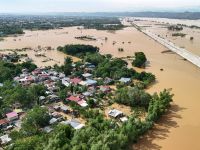Iraq has criticized attempts by Russia's Foreign Ministry to convince Baghdad to allow international weapons inspectors inside the country, Iraqi Vice-President Taha Yasin Ramadan has said.
"The Russian Foreign Ministry proposed a plan concerning the inspectors eight months ago. I hurried to Moscow. We explained to [Russian] President Putin that the plan was harmful, and he immediately instructed your Foreign Minister to stop those activities," Ramadan said in an interview to the Vremya Novostei newspaper, published on Monday, and quoted by the Russian Interfax News Agency.
Russian President Putin "did that right in front of me. He told the Russian Foreign Minister that any moves should be coordinated with Iraq," the vice-president conveyed. "And your Foreign Ministry started to do the same six months later. They say Iraq is in danger, let's work on this draft," Ramadan complained.
With regards to the Russian proposals on an Iraqi settlement, which have been put forth in the UN Security Council, the vice-president said "it seems that the draft is Russian in form, but it is very bad in its essence."
"What will happen is that Iraq will not accept the draft and Russia will not be able to vote it down in the UN Security Council because it is a Russian draft," Ramadan said.
"The United States may use it as a pretext for new aggression" against Baghdad. "Back then we managed to convince President Putin. We did not even insist on Russia's vetoing the U.S. attempts to promote anti-Iraqi drafts in the UN Security Council. We said let Russia abstain if it is difficult for it to veto [the drafts]," Ramadan added.
"Last year Russia thwarted the American draft of silly sanctions [the so-called smart sanctions proposed by the United States and Great Britain] in the UN Security Council without a veto," he said.
"Now, being concerned about the Russian Foreign Ministry's return to the previous proposal, we sent Deputy Prime Minister Tariq Aziz to Moscow [in late January]," Ramadan emphasized.
Ramadan denied various speculations that Aziz had brought to Moscow "a certain positive answer" to the Russian proposals.
"It looks like we are back to the situation that existed during my visit [to Russia] almost a year ago," Ramadan suggested.
In addition, Baghdad is strongly opposed to American-Russian consultations on a new list of goods prohibited for import to Iraq, which is planned for this week in Switzerland, he pointed out.
"It is high time to lift sanctions against Iraq instead of discussing new lists. If this list is approved, Russian businessmen will be the first to be affected," Ramadan stressed. "The new list will ban the import of Russian goods we get now.
Large-size wheels, heavy equipment, tower cranes, pumps, machinery, all that will be banned. We do not buy tomatoes and potatoes from Russia, we buy heavy equipment!" he declared.
The anti-Iraqi sanctions "should be washed out," Ramadan urged. "We are actively working on this. We are signing contracts and building relations. Our partners sometimes keep silent about that, but they are washing out the sanctions we have unfairly lived under for 12 years," he noted.
In the aftermath of the September 11 attacks, the United States "has toughened its policy even more, which was the reason for the events in New York and Washington: its policy has become even dirtier," Ramadan stated.
Ramadan warned, "If nothing changes, America will draw even larger fire on itself. Something even more dreadful than the events of September 11 may happen. It will be a very tough response".
UN
Meanwhile, Iraq is ready to reopen talks with the secretary general of the United Nations, it was announced Monday night, according to the British Guardian newspaper.
According to this report, it seems this is an indication the Iraqi President is beginning to act amidst increased pressure exerted on him recently from Washington and perhaps from other sources.
Kofi Annan received the offer of unspecified "dialogue" during a meeting in New York Monday with Amr Moussa, the secretary general of the Arab League, the UN said.
Amr Moussa received the “green light” to make the talks offer in Baghdad last month, the UN statement added. He returned "with a message from Iraqi president Saddam Hussein saying the Iraqis were prepared to resume dialogue with the secretary general without any preconditions".
It was not clear what would actually be discussed, or whether the announcement meant the return of UN weapons inspectors to Iraq after an absence of three years.
However, Annan would find a date in his diary to "discuss implementation of relevant security council resolutions" with a delegation from Baghdad, according to the UN statement.
Discussions between Annan and representatives of Saddam Hussein’s regime failed last year, when Iraq demanded the lifting of sanctions against the country, imposed after its invasion of Kuwait in August 1990, as a precondition for continued dialogue.
The UN security council has refused to lift the sanctions until Iraq can prove that it is no longer seeking to build its chemical, nuclear or biological weapons capability.
However, a CIA report released last week said Iraq had probably spent the past three years building such a capability.
The move follows U.S. President George Bush's state of the union address to Congress last week, in which he singled out Iraq as part of an "axis of evil", along with North Korea and Iran, which are developing weapons of mass destruction.
Iraq's announcement is part of an effort by Baghdad to improve its international position and wear down international support for any military operations against it.
Iraqi government officials have met with Russian, Chinese, Arab and EU diplomats in the last weeks, and Saddam Hussein has also offered concessions to Kuwait on the issue of prisoners seized during the 1991 Gulf war.
Last week the Iraqi leader said he would permit a UN human rights inspector to visit Iraq for the first time in 10 years.
In addition, representatives of Saddam's government also met with Swiss officials, agreeing to reopen Baghdad's embassy in Switzerland after a closure of 11 years.
The regime also continues to engage in closer relations with Iran, with which it fought a deadly eight-year war during the 1980s. Direct flights will soon resume between the two countries for the first time in some twenty years, and recent months have seen more releases of prisoners captured during the war. (Albawaba.com)
© 2002 Al Bawaba (www.albawaba.com)







